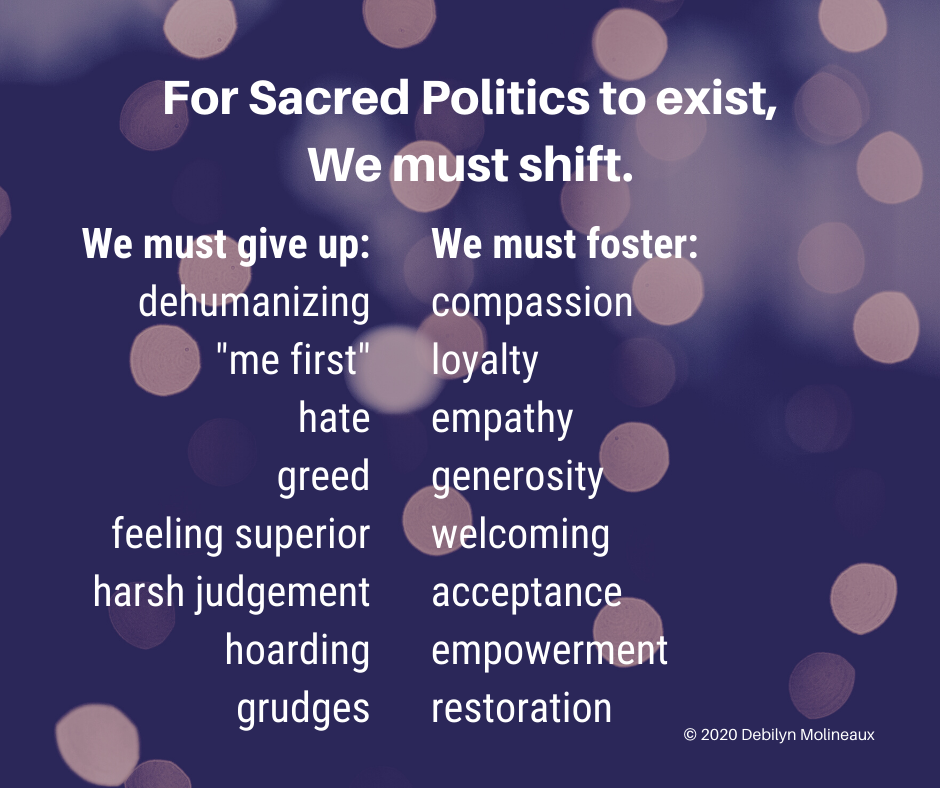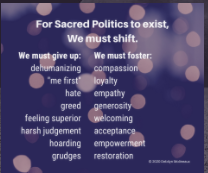Originally published in AllSides
Debilyn Molineaux, AllSides

We’ve all had notable events that shaped us. The memory is burned with clarity about the shift; what “was” is now forever changed. These memories stand out from the backdrop of our day-to-day lives. The miracle of an ordinary moment becoming an extraordinary event that transforms us or the world to become a sacred story of becoming who we are.
Politics, too can be sacred. A place where we move with power and awe from what was to what we will become. We’ve done this before in times of strife. We’ve advanced big visions into law for the betterment of humankind. Now is the time for new bold visions and an advancement based in our common humanity.
Lately, we have experienced profane politics through two-party warfare and dehumanization of each other. Some among us choose to be profane and others are bystanders. Yet most of us long for something sacred, a nation worth our reverence. As we explore what sacred and profane politics are, let’s start by defining terms for this article:
Sacred: reverently dedicated to some person, purpose, or object:
secured against violation, infringement, etc., as by reverence or sense of right
Profane: to misuse (anything that should be held in reverence or respect); defile; debase; employ basely or unworthily.
The term sacred is normally reserved for religious use. But here, it is this larger meaning of connection to something bigger than ourselves to which I apply “sacred” for this writing.
When we feel reverence, awe or wonder; when we witness compassion; when we explore nature, care for a loved one, enjoy a deep conversation that enlivens our soul, are moved by the spirit in worship, we feel connected to something bigger than ourselves. We are reverent in the presence of the sacred culture to which we aspire.
When we dehumanize, cheat, steal or lie, or witness such acts, we disconnect from each other. These are acts of profane human behavior. We become disappointed in each other and trust is eroded. Small profane acts build up over time until we are living in a toxic stew. We are living in a profane culture to which we all contribute.
In this polarizing time, we must call upon ourselves to participate in the death of the profane culture by contributing to the birth of a sacred culture. But how do we do this?
We birth a sacred culture by seeking reverence in our lives, in each other and yes, in politics. But first, we must identify principles and values that are essential to a sacred culture, and which we can foster in ourselves for the sake of a better world.
- Honor — holding a reverence for each other and our efforts to do our best.
- Compassion — deep caring based on our shared humanity.
- Loyalty — loyal to our shared values, to each other and commitment to get through the crisis together.
- Empathy — willingness to feel and share someone else’s experience without seeing them as less than ourselves.
- Generosity — open heartedly sharing what we do not need and receiving from others what we do need.
- Belonging — reaching out to those isolated and vulnerable, spending time with them to foster a sense of mattering to you and in the world. Feeling deeply connected ourselves.
- Acceptance — allow people to be their authentic, messy selves and know that it’s OK. Accept that we may need to take action we don’t like or sacrifice in new ways. We’re all messy sometimes. Put aside judgement unless there is harm for themselves or others.
- Responsibility — owning our mistakes or harm and attempt to restore wholeness or to atone.
- Equity — ensuring the systems in place serve the most vulnerable among us with the least power.
- Grace — forgiveness that comes easily and quickly so we can move forward.
Are we willing to lay down our tools of profanity (which may also be emotional shields) to “revere” our political system for the good of all? Can we let go of our “win at any cost” mindset? Can we avoid pervasive situational ethics that results in defending the indefensible when our side is wrong?
The shift from profane to sacred is a hero’s journey that we can take together. Today, we are an army of heroes, where we are accountable to one another. Will you make the following shifts?
- From dehumanizing to compassionate
- From “me first” to loyal to each other, and to our own values
- From hate to walking in another’s shoes, expressing empathy
- From greedy or stingy to generous in our listening, our time, our money
- From feeling special to being welcoming and inclusive, especially with people who are “othered”
- From judgmental to tolerant or accepting
- From hoarding and centralizing (power, money) to being of service to and empowering others
- From grudge-holding/punitive to acting with a heart of restorative justice, to make amends for harm caused (individually and collectively)
This is not a call to a camp-fire, kumbaya moment. We will continue to fight with each other for the policies and government and politicians we prefer. But we can change the rules of engagement.
Here is the catch. Some of us want the power more than the sacred and once profanity is engaged, it is hard to disengage for fear of “losing.” As long as the “ends justifies the means” we are playing the game by profane rules. Profanity wins. This is where courage, vulnerability and love will transform the rules of engagement. By acting from the values and ideals of the sacred — connecting with and to reverence — we cease to be triggered by others profanity, and cease to respond in kind. This breaks the cycle of profanity.
When we become aware of the profanity within ourselves, we can choose to prioritize new rules of engagement over outcome, and miraculously by doing so the outcome we end up with is better than we could possibly imagine. And we need to be patient. It takes time. Like an addict in recovery, we need to practice one day at a time and stay committed to a better life, despite outward appearances.
What will we choose?

